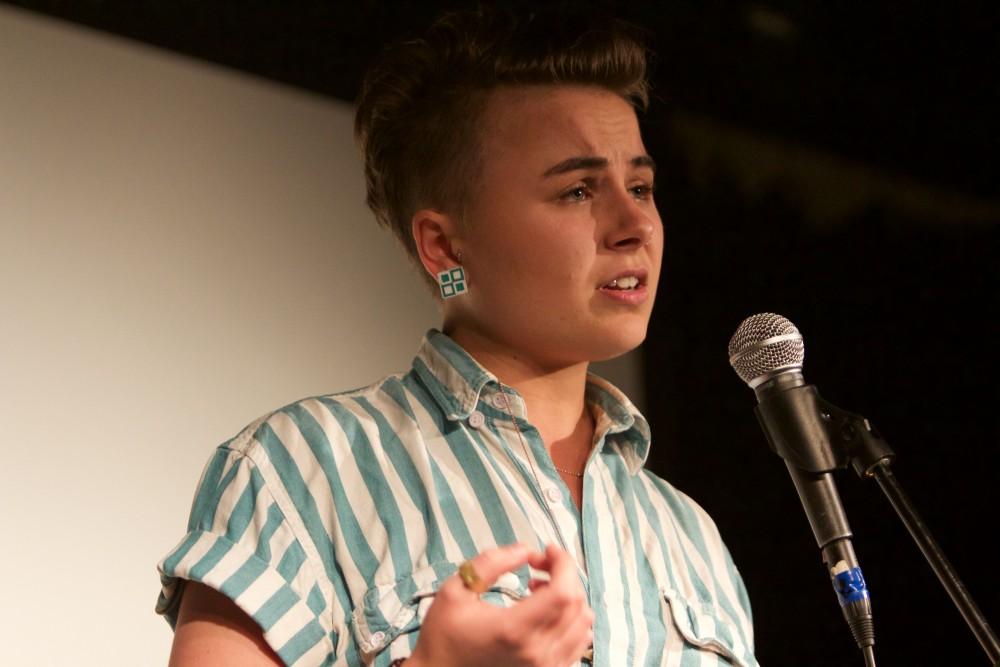GVSU student slam poets to host open mic to draw new members

GVL/Mackenzie Bush – Kelsey Fraser performs at Oppression Out Loud Poetry Slam, presented by Eyes Wide Open, Thursday, Nov. 10, 2016 in Area 51.
Oct 23, 2017
While professional slam poetry can be intense, engaging and competitive, the start for many poets begins at an open mic. Grand Valley State University slam poets Rachel Jenkin, Annie Livingston, Jenna Sobaski and Michelle Roldan hope to inspire creativity at the “Roots of the Future Open Mic” Wednesday, Oct. 25.
The four women, all members of the GVSU Tendons + Teeth Poetry Slam Team last year, organized the event as the first of many open mic nights to come, Jenkin said. For the group’s first open mic, Jenkin expects the tone to be inviting with a goal of welcoming students both to the team and to performing poetry publicly.
“We want to give people a chance to practice their poetry, go up in front of people and get an idea of who we are,” Jenkin said. “So, we figured that putting on an open mic night, even before we find out about forming the slam poetry team and preparing for that, would especially (be) for the people who are on edge or don’t really know who we are yet.”
The team performed to compete at the College Unions Poetry Slam Invitational (CUPSI) last year, but this year, they are shifting the initial focus toward inviting students to experience poetry and toward increasing membership. For many, Livingston said, open mic nights can initially be intimidating, so breaking the mold is important.
“Usually, how these things go, … people are a little hesitant at first, and if somebody gets up and is like, ‘Yeah, I’ll read something,’ and does so with enthusiasm, then generally the crowd is willing to participate,” Livingston said. “So, I’m more than happy to do that. I don’t want the open mic night to be competitive for its first time.”
The open mic night also provides inspiration for those who don’t write traditional poetry. For GVSU musician Ian Arnold, his attendance at open mic poetry events in the past has given him a sense of introspection in the creative process and a sense of vulnerability.
“Whenever I’m playing music, personally, what I write in my lyrics, in my music, it’s sort of a meditative practice for me,” Arnold said. “It’s an emotional process. … It’s (about) processing those emotions, savoring those emotions. I hope that reflected in my music, people can see and hear their own struggles, their own joys.”
Arnold said attending events such as the open mic night is important for all types of artists. For Arnold, one motivating factor behind recording an album with his band was the support he got from other artists at open mic nights.
“Go to every open mic that is available because that’s how you start meeting other people that are interested in the same things as you, and you start collaborating with people; you start making friends from it,” Arnold said. “It’s a great way for new artists, no matter your style, to help yourself grow.”
With poetry being an individualized process, Roldan said poems range from serious to comical. Regardless, she said she feels that the sharing of emotions is more important than how experienced the poet is.
“I’ve never shared (my poetry) before last year, and I think it’s really rewarding when you think you’re struggling with something, and you’ve worked on your struggles, and everyone in the room is like, ‘Yes, I agree with you,’” Roldan said. “It’s empowering. No one really tears you down for how good or how bad your poetry is.”
It’s that support, Jenkin said, that turns the group away from being a competitive slam poetry team and toward being a community of supportive individuals.
“My poetry has a lot of personal stuff, and I think a lot of people tend to write about their experiences, positive or negative, but I think that’s kind of the thing that makes it very personal and makes it feel like a poetry family,” Jenkin said. “It’s a lot of empathy in one room.”
With the open mic night being the first of its kind for the year, Livingston said students need to drop their preconceived notions on the art and experience it.
“My dream here is that a bunch of people come to the Multipurpose Room in the library and people get up and share stuff and that we have a variety of people reading poems, especially a lot of people who hadn’t been in that space before, hadn’t thought that poetry was for them,” Livingston said. “There’s this myth that poetry can be really esoteric. … I want people to redefine poetry. So, if one person gets up and shares a story and feels empowered by that, that’s really enough.”

























